Stars of the New Curfew Read online
Page 14
‘The lights have returned!’
The houses, the stalls with electric bulbs, the shops, all suddenly lit up. It was as if the city had woken from sleep. Ede joined in the cheering. He felt as if a burden had fallen from him. He felt freed from a mysterious pestilence.
At the bottleneck in front of the madam’s shop the excitement about the lights turned into commotion. The crowd pushed and struggled, their faces defined in new energies. There was confusion everywhere; people seemed to be running in all directions. After a while Ede realized that the commotion was caused by the movement of cattle being driven towards the corral. He also soon realized that he was trapped between the moving hulks of cattle and the immoveable wall of the crowd. Then he heard someone close by call out:
‘Ede! Ede!’
He looked round and saw the handsome acolyte in the crowd, separated from him by the moving cattle. When Ede saw the boy, he knew.
‘Maria …’ the boy shouted, and made a hopeless gesture.
Ede stood confused. He turned and stumbled sideways. He tried to reach the acolyte but he found himself struggling against the grain of the crowd. Someone pushed him. He fell. The crowds, in their hysteria, swept over him. When he got up he felt as if his joints had been wrenched out of their sockets.
‘Ede! Ede!’ the boy called. ‘Stay there. I am coming over.’
But Ede couldn’t stand still. He staggered and tripped on the wares of the madam’s stall. As he got up he saw Maria standing over him. Then she disappeared and in her place was a midget-girl, with an old body, a young face, and a weird growth of beard. The midget-girl pointed at him and shouted something. She began to jump up and down, pointing excitedly. A moment later Ede heard what she was shouting:
‘Djrunk! Djrunk!’
As Ede got up the wares of the stall, the masks, the plates, the trinkets, seemed to cling to his hands.
‘Djrunk! Thief!’
The last word went round, and grew in volume. The crowd turned on him. Ede tried to escape, but the market-women caught him and set upon him with sticks and stones. The blood flowed over his face and the lights of the world went out slowly in his eyes. The acolyte arrived too late.
Deep in the marketplace, amid all the cacophony, a woman sang in a voice of agonized sweetness. In Ede’s street the electric bulbs swayed in the breeze. The dogs barked at the dust. The wind sighed over the rooftops. Neighbours were quiet, and couples had made up their quarrels. Ede’s mother stayed up that night, listening to the frogs croaking all over the marshland.
WHAT THE TAPSTER SAW
THERE WAS ONCE an excellent tapster who enjoyed climbing palm-trees as much as the tapping of their wines. One night he dreamt that while tapping for palm-wine he fell from the tree and died. He was so troubled by the dream that late as it was he went to visit his friend, Tabasco, who was a renowned herbalist. But that night Tabasco was too busy to pay much attention to what the tapster was saying. Harassed by the demands of his many wives, the herbalist kept chewing bundles of alligator pepper seeds and dousing his mouth with palm-wine. When the tapster was about to leave the herbalist drew him aside and, with curious irrelevance, said:
‘I used to know a hunter who, one day while hunting, saw a strange antelope. He followed the antelope till it came to an anthill. To his surprise the antelope turned into a woman and then disappeared. The hunter waited near the anthill for the woman to reappear. He fell asleep and when he woke up the ground was full of red water. He looked up and found himself surrounded by nine spirits. He went mad, of course. It took me three weeks to recover after I went inside his head to cure him. A little of his madness entered me. Tomorrow if you bring me three turtles and a big lobe of kola nut I will do something about your dream. But tonight I am very busy.’
The tapster agreed and, disappointed, went back home and drank his way through a gourd of palm-wine. He managed to forget his dream by the time he fell asleep.
In the morning he gathered his ropes and magic potions, tied three empty gourds to his bicycle, and rode out into the forest to begin his day’s work. He had been riding for some time when he came to a signboard which read: DELTA OIL COMPANY: THIS AREA IS BEING DRILLED. TRESPASSERS IN DANGER. The tapster stared at the signboard without comprehension. Further along he noticed a strange cluster of palm-trees. He rode through thick cobwebs in order to reach them. The smell of their red-green bark intoxicated him. He immediately tied his magic potions to one of the tree-trunks, brought out his rope, and proceeded to climb. Pressing his feet on both sides of the tree, switching the rope high up the rough rungs of the bark, he pulled himself up rapidly, till his chest began to ache. The morning sun, striking him with an oblique glare, blinded him. As the golden lights exploded in his eyes the branches of the palm-tree receded from him. It was the first time he had fallen in thirty years.
When he woke up he was surprised that he felt no pain. He even had the curious feeling that the fall had done him some good. He felt unbelievably light and airy. He walked through spangles of glittering cobwebs without the faintest idea of where he was going. Fireflies darted into his nose and ears and re-emerged from his eyes with their lights undimmed. He walked for a long time. Then he saw another signboard which read: DELTA OIL COMPANY: TRESPASSERS WILL BE PERSECUTED. Around him were earth-mounds, gravestones, a single palm-tree, and flickering mangrove roots. He made a mark on the tree-trunk. Suddenly it became a fully festered wound. As he passed the twisting roots, troubled by the whitish ichors of the wound, they clasped him round the ankles. They held him down and tickled him. When he began to laugh they let him go.
He came to a river, whose water was viscous and didn’t seem to move. Near the river there was a borehole. Three turtles lazed on the edge of the borehole, watching him. One of the turtles had Tabasco’s face. The tapster was about to say something when a multi-coloured snake emerged from the borehole and slithered past him. When the snake slid into the river the colour of the water changed, and it became transparent and luminous. The snake’s skin burned with a roseate flame. While the tapster looked on a voice behind him said:
‘Don’t turn round.’
The tapster stayed still. The three turtles gazed at him with eyes of glass. Then the turtle that had Tabasco’s face urinated in the tapster’s direction. The turtle seemed to enjoy the act. The ecstasy on its face made it look positively fiendish. The tapster laughed and a heavy object hit him on the head from behind. He turned round swiftly and saw nothing. He laughed again and was whacked even harder. He felt the substance of his being dissolve. The river seemed to heave during the long silence which followed.
‘Where am I?’ the tapster asked.
There was another silence. The snake, glittering, slid back out of the river. When the snake passed him it lifted its head and spat at him. The snake went on into the borehole, dazzling with the colours of the sun. The tapster began to tremble. After the trembling ceased a curious serenity spread through him. When he looked around he saw that he had multiplied. He was not sure whether it was his mind or his body which flowed in and out of him.
‘Where am I?’
The voice did not answer. Then he heard footsteps moving away. He could not even sleep, for he heard other voices talking over him, talking about him, as if he were not there.
In that world the sun did not set, nor did it rise. It was a single unmoving eye. In the evenings the sun was like a large crystal. In the mornings it was incandescent. The tapster was never allowed to shut his eyes. After a day’s wandering, when he lay by the borehole, hallucinating about palm-wine, a foul-smelling creature would come and stuff his eyes with cobwebs. This made his eyes itch and seemed a curious preparation for vision. When the tapster tried to sleep, with his eyes open, he saw the world he knew revolving in red lights. He saw women going to the distant marketplaces, followed by sounds which they didn’t hear. He saw that the signboards of the world were getting bigger. He saw the employees of the oil company as they tried to level the forests. When he was h
ungry another creature, which he couldn’t see, would come and feed him a mess of pulped chameleons, millepedes and bark. When he was thirsty the creature gave him a leaking calabash of green liquid. And then later at night another creature, which smelt of rotting agapanthus, crept above him, copulated with him, and left him the grotesque eggs of their nights together.
Then one day he dared to count the eggs. They were seven. He screamed. The river heaved. The snake stuck its head out from the borehole and the laughter of death roared from the sun. The laughter found him, crashed on him, shook him, and left large empty spaces in his head.
That night he fled. Everything fled with him. Then, after a while, he stopped. He abused the place, its terrible inhabitants, its unchanging landscape. Unable to escape, he cursed it ferociously. He was rewarded with several knocks. Then, as the eggs tormented him with the grating noises within them, as if a horrible birth were cranking away inside their monstrous shapes, he learned patience. He learned to watch the sky, and he saw that it wasn’t so different from the skies of his drunkenness. He learned not to listen to the birth groaning within the eggs. He also learned that when he kept still everything else around him reflected his stillness.
And then, on another day, the voice came to him and said:
‘Everything in your world has endless counterparts in other worlds. There is no shape, no madness, no ecstasy or revolution which does not have its shadow somewhere else. I could tell you stories which would drive you mad. You humans are so slow – you walk two thousand years behind yourselves.’
The voice was soon gone.
Another voice said to him:
‘You have been dead for two days. Wake up.’
A creature came and stuffed his eyes with cobwebs. His eyes itched again and he saw that the wars were not yet over. Bombs which had not detonated for freak reasons, and which had lain hidden in farms, suddenly exploded. And some of those who lived as if the original war was over were blown up while they struggled with poverty. He saw the collapse of bridges that were being repaired. He saw roads that spanned wild tracts of forests and malarial swamps, creeks without names, hills without measurements. He saw the mouth of the roads lined with human skeletons, victims of mindless accidents. He saw dogs that followed people up and down the bushpaths and brooding night-tracks. As soon as the dogs vanished they turned into ghommids that swallowed up lonely and unfortified travellers.
Then he saw the unsuccessful attempts to level the forest area and drill for oil. He saw the witch-doctors that had been brought in to drive away the spirits from the forest. They also tried to prevent the torrential rains from falling and attempted to delay the setting of the sun. When all this failed the company hired an expatriate who flew in with explosives left over from the last war. The tapster saw the expatriate plant dynamite round the forest area. After the explosion the tapster saw a thick pall of green smoke. When the smoke cleared the tapster watched a weird spewing up of oil and animal limbs from the ground. The site was eventually abandoned. Agapanthus grew there like blood on a battlefield.
The tapster saw people being shot in coups, in secret executions, in armed robberies. He noticed that those who died were felled by bullets which had their names on them. When his eyes stopped itching the tapster wandered beneath the copper bursts of the sky. He noticed that there were no birds around. Streamers of cobweb membranes weaved over the wounded palm tree.
And then one day, fired by memories of ancient heroes, he pursued a course into the borehole. In the strange environment he saw the multi-coloured snake twisted round a soapstone image. He saw alligators in a lake of bubbling green water. He saw an old man who had died in a sitting position while reading a bible upside-down. Everything seemed on fire, but there was no smoke. Thick slimes of oil seeped down the walls. Roseate flames burned everywhere without consuming anything. He heard a noise behind him. He turned and a creature forced a plate containing a messy substance of food into his hands. The creature then indicated that he should eat. The multi-coloured snake uncoiled itself from the soapstone image. While the tapster ate the snake slid over and began to tell him bad jokes. The snake told him stories of how they hang black men in quiet western towns across the great seas, and of how it was possible to strip the skin off a baby without it uttering a sound. The snake laughed. Partly because the snake looked so ridiculous, the tapster laughed as well. Several sharp whacks, as from a steel edge, drummed on his head, and put him out for what could have been aeons of time.
When he recovered he traced his way out of the place. As he passed the man who had died reading the bible upside-down he saw that the man looked exactly like him. He fled from the borehole.
His impatience reached new proportions. He counted the rocks on the ground. He counted the cobwebs, the colours of the sun, the heavings of the river. He counted the number of times the wind blew. He told himself stories. But he found that whatever he told himself that was subversive was simultaneously censored by the knocks. He counted the knocks. He grew used to them.
Then the voice came to him again. It sounded more brutal than usual. The voice said:
‘Do you like it here?’
‘No.’
The tapster waited for a knock. It didn’t arrive.
‘Do you want to leave?’
‘Yes.’
‘What’s stopping you?’
‘I don’t know how.’
The voice was silent.
Another voice said:
‘You have been dead for three days.’
The tapster, who had seen the sky and earth from many angles, who knew the secrets of wine, had learned the most important lesson. He listened without thinking.
‘If you want to leave,’ the voice said, ‘we will have to beat you out.’
‘Why?’
‘Because you humans only understand pain.’
‘We don’t.’
There was another pause. He waited for a knock. It came. His thoughts floated around like cobwebs on the wind. The tapster stayed like that, still, through the purple phases of the sun. After a long while the voice said:
‘Here are some thoughts to replace the ones that have been knocked away. Do you want to hear them?’
‘Yes.’
The voice coughed and began:
‘Even the good things in life eventually poison you. There are three kinds of sounds, two kinds of shadows, one gourd for every cracked head, and seven boreholes for those that climb too high. There is an acid in the feel of things. There is a fire which does not burn, but which dissolves the flesh like common salt. The bigger mouth eats the smaller head. The wind blows back to us what we have blown away. There are several ways to burn in your own fire. There is a particular sound which indicates trouble is coming. And your thoughts are merely the footsteps of you tramping round the disaster area of your own mind.’
‘Thank you,’ the tapster said.
The voice left. The tapster fell asleep.
When he woke up he saw the three turtles lazing again at the edge of the borehole. The turtle with Tabasco’s face had on a pair of horn-rimmed glasses and a stethoscope round his neck. The turtles broke a kola nut, divided it amongst themselves, and discussed gravely like scholars without a text. The multi-coloured snake came out of the borehole and made for the river. It paused when it neared the turtles. The tapster was fascinated by its opal eyes.
‘There are six moons tonight,’ said the turtle with Tabasco’s face.
‘Yes, there are six moons tonight,’ agreed the other turtles.
The snake, lifting up its head, its eyes glittering at the firmament, said:
‘There are seven moons tonight.’
The turtles were silent. The snake moved on towards the river. The turtle with Tabasco’s face picked up a little rock and threw it at the snake. The other turtles laughed.
‘There are no snakes tonight,’ said the turtle with Tabasco’s face.
As if it were a cue, the other turtles set upon the snake. Tabasco the t
urtle grabbed it by the neck and began to strangle it with the stethoscope. The other turtles beat its head with rocks. The snake lashed out with its tail. Tabasco and the snake rolled over and fell into the borehole. Noises were heard below. After a while Tabasco the turtle emerged without his glasses and stethoscope. He took up his place amongst the others. They broke another kola nut. Then Tabasco the turtle began to prepare a pipe. Instead of tobacco, he used alligator pepper seeds. He lit the pipe and motioned to the tapster to come closer. The tapster went and sat amongst the turtles on the edge of the borehole. Tabasco the turtle blew black ticklish smoke into the tapster’s face and said:
‘You have been dead for six days.’
The tapster didn’t understand. The turtles gravely resumed their discussions on the numbers of heavenly bodies in the sky.
After some time the smoke had the effect of making the tapster float into a familiar world. A tickling sensation began in his nose. He floated to a moment in his childhood, when his mother carried him on her back on the day of the Masquerades. It was a hot day. The Masquerades thundered past, bellowing plumes of red smoke everywhere so that ordinary mortals would be confused about their awesome ritual aspects. All through that day his nose was on fire. And that night he dreamt that all sorts of mythical figures competed as to who could keep his nose on his face. He re-lived the dream. The mythical figures included the famous blacksmith, who could turn water into metal; the notorious tortoise, with his simple madness for complex situations; and the witch-doctors, who did not have the key to mysteries. As they competed his mother came along, drove them away by scattering a plate full of ground hot pepper, worsening the problem of his nose.
And while the tapster floated in that familiar world the voice came and bore down on him. Another voice said:

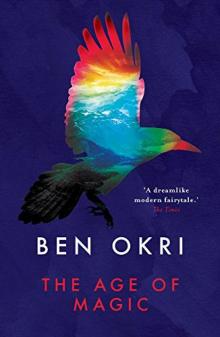 The Age of Magic
The Age of Magic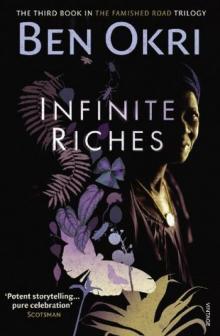 Infinite Riches
Infinite Riches Songs of Enchantment
Songs of Enchantment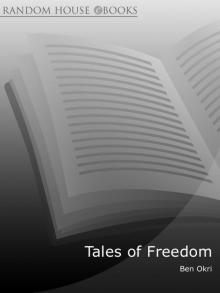 Tales of Freedom
Tales of Freedom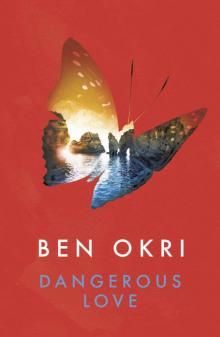 Dangerous Love
Dangerous Love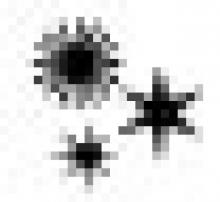 Starbook
Starbook The Famished Road
The Famished Road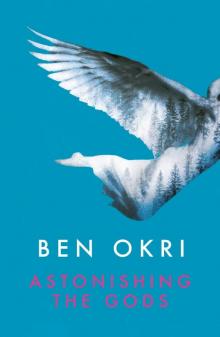 Astonishing the Gods
Astonishing the Gods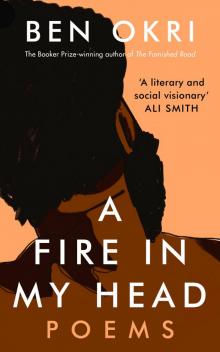 A Fire in My Head
A Fire in My Head The Freedom Artist
The Freedom Artist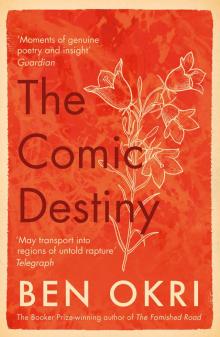 The Comic Destiny
The Comic Destiny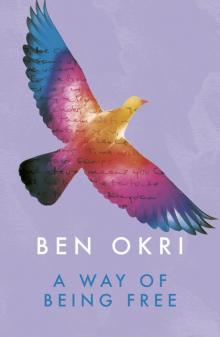 A Way of Being Free
A Way of Being Free Prayer for the Living
Prayer for the Living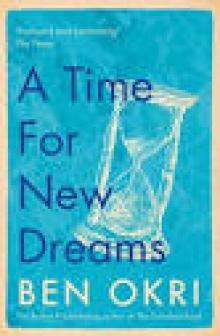 A Time for New Dreams
A Time for New Dreams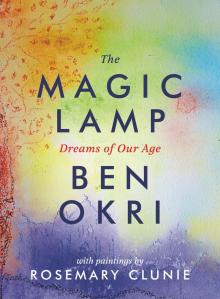 The Magic Lamp
The Magic Lamp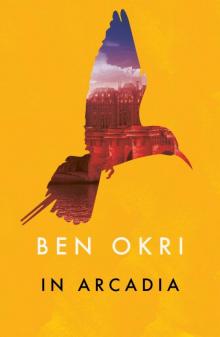 In Arcadia
In Arcadia